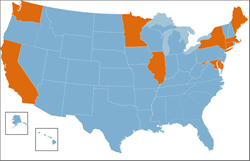
Sarah Doll is the National Director at SAFER States.
In Safer States’ August blog post, we take a look at recent toxics legislation. As legislative sessions around the country wrap up it’s a good time to take stock of the landscape. Even in the wake of federal struggles, economic concerns and industry backed opposition, states continue to take on and pass toxic laws and policies. And, inspiringly, this legislation has passed with broad bipartisan support. Although we’d love to see more action on the federal level, it’s inspiring to see the states take the lead, and recognize that protecting people from toxics is a critical bipartisan issue.
So far in 2011, nine new toxic chemical policies have been passed in seven states, adding to a total of over 80 chemical safety laws passed in the last nine years by an overwhelming margin (see the Healthy States report for more details on bipartisan support for toxics reform). In 2011, 99% of Democrats and 86% of Republicans supported these policies. In addition to bills passed, protections also increased through administrative action and rule implementation. In total, 10 states in 2011 have made changes in favor of a healthier, less toxic environment for families and future generations.
Some firsts:
- Connecticut became the first state in the nation to ban bisphenol-A (BPA) from thermal receipt paper.
- Washington became the first state to require manufacturers of children’s products to report what toxic chemicals are present in their products.
- New York was the first state in the nation to ban products for children containing the toxic tris flame retardant linked to cancer.
On the federal landscape this year, Senator Frank Lautenberg introduced the Safe Chemicals Act of 2011 (S.847), which would overhaul the Toxic Substances Control Act (TSCA)—the outdated law that oversees toxic chemical use in the United States. Environmental advocates and sympathetic legislators have been working hard to pass legislation making TSCA current. TSCA was originally enacted during the Ford administration and has never been updated.
“It’s time for the federal government to step up and join the efforts of state leaders to protect public health.”
The Safe Chemicals Act would reform TSCA, which has proven ineffective in identifying and reducing the use of toxic chemicals. The proposed bill was introduced into the U.S. Senate in April, and has to date not made any progress.
Meanwhile, states are shouldering the load and protecting their residents from toxic chemicals to the best of their ability. In addition to the “firsts” listed above, in 2011:
- California and Illinois passed resolutions urging Congress to update TSCA.
- Delaware, Maryland and Maine passed laws against BPA. Additionally, the Massachusetts Public Health Council approved a ban on BPA in baby bottles and sippy cups through an administrative action.
- Massachusetts declared formaldehyde and hexavalent chromium to be high risk chemicals.
- Maryland banned cadmium in jewelry for children.
- Minnesota published a list of nine Priority Chemicals of High Concern that are found in the body, setting the stage for the phase-out of these chemicals.
State laws continue to pass, despite industry opposition

Nearly every time a proposed toxic chemical law is being discussed in statehouses across the country, representatives from some of the nation’s largest industries show up to fight. State advocates report seeing representatives from the Toy Industry Association, the American Chemistry Council, the Grocery Manufacturers’ Association and other similar organizations at their hearings. These organizations put their bottom line above public health and attempt to use economic scare tactics, distort legislation and marginalize overwhelming scientific evidence against toxic chemicals to convince legislators to vote against protective laws.
It’s hard to know exactly how much money industry is spending to fight these laws, but reports show that they are willing to spend big bucks to protect their interests – Environment & Energy Daily reports that players in the chemical industry spent $4 million in lobbying money—just in the first quarter of 2011 and just on federal laws.
In February, we talked in detail about the specific tactics industry employs against state legislation.
Legislators on both sides of the aisle time and time again stepped up to pass laws despite industry efforts.
This year, industry tactics played out in Maine in dramatic fashion. While Maine passed a “Kids Safe Products Act” in 2008, Governor Paul LePage, a newly-elected, Tea Party-backed Republican, set about to repeal the law and question whether BPA needed to be banned. It was uncovered that out-of-state lobbyists and large trade groups had the ear of the Governor and were advising him to repeal the law. A four-month back-and-forth about banning BPA ended when the Maine House voted by a 145-3 margin to phase out BPA, overriding Governor LePage’s veto.
If the first seven months of 2011 are any indication, state legislators will continue to respond to the cries of their constituents and understand that Americans want their health and the health of their children prioritized in statehouses across the country.



